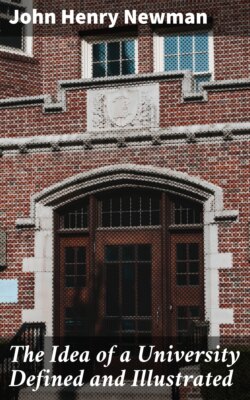Читать книгу The Idea of a University Defined and Illustrated - John Henry Newman - Страница 49
На сайте Литреса книга снята с продажи.
14.
ОглавлениеTable of Contents
And now to sum up what I have been saying in a few words. My object, it is plain, has been—not to show that Secular Science in its various departments may take up a position hostile to Theology;—this is rather the basis of the objection with which I opened this Discourse;—but to point out the cause of an hostility to which all parties will bear witness. I have been insisting then on this, that the hostility in question, when it occurs, is coincident with an evident deflection or exorbitance of Science from its proper course; and that this exorbitance is sure to take place, almost from the necessity of the case, if Theology be not present to defend its own boundaries and to hinder the encroachment. The human mind cannot keep from speculating and systematizing; and if Theology is not allowed to occupy its own territory, adjacent sciences, nay, sciences which are quite foreign to Theology, will take possession of it. And this occupation is proved to be a usurpation by this circumstance, that these foreign sciences will assume certain principles as [pg 097] true, and act upon them, which they neither have authority to lay down themselves, nor appeal to any other higher science to lay down for them. For example, it is a mere unwarranted assumption if the Antiquarian says, “Nothing has ever taken place but is to be found in historical documents;” or if the Philosophic Historian says, “There is nothing in Judaism different from other political institutions;” or if the Anatomist, “There is no soul beyond the brain;” or if the Political Economist, “Easy circumstances make men virtuous.” These are enunciations, not of Science, but of Private Judgment; and it is Private Judgment that infects every science which it touches with a hostility to Theology, a hostility which properly attaches to no science in itself whatever.
If then, Gentlemen, I now resist such a course of acting as unphilosophical, what is this but to do as men of Science do when the interests of their own respective pursuits are at stake? If they certainly would resist the divine who determined the orbit of Jupiter by the Pentateuch, why am I to be accused of cowardice or illiberality, because I will not tolerate their attempt in turn to theologize by means of astronomy? And if experimentalists would be sure to cry out, did I attempt to install the Thomist philosophy in the schools of astronomy and medicine, why may not I, when Divine Science is ostracized, and La Place, or Buffon, or Humboldt, sits down in its chair, why may not I fairly protest against their exclusiveness, and demand the emancipation of Theology?
